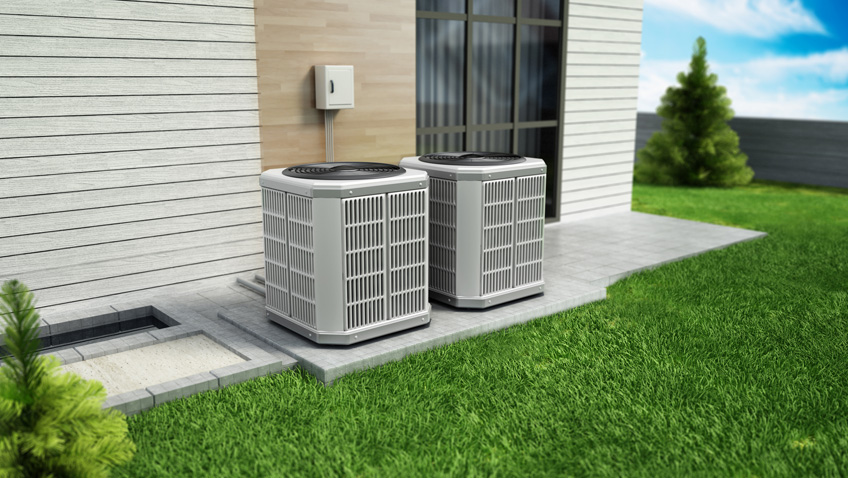If your pre-season air conditioner inspection shows it’s time to consider a replacement, take a look at a heat pump. That’s right, a heat pump.
Heat Pumps Aren’t Just for Heating
Heat pumps are suffering from an identity crisis. While they do, in fact, pump heat around, they do it in a way that both heats and cools your home. That’s why some in the air handling industry are looking for ways to rebrand the product to make its dual functions more apparent.
The problem is that all the good names are taken.
When William Carrier invented the heat pump to exchange hot air for cold, he called it an air conditioner and the name stuck as the term for cooling systems. Of course it was equally good at heating, but that’s not what he was selling.
Heat pumps extract energy from ambient air and since there’s still a lot of energy even in cold air (Lord Kelvin showed that back in the 1850s), “Kelvinator” would be a good name, but it was trademarked for a refrigeration company in 1914. So until someone comes up with a better name, we’ll have to stick with “heat pump” and let people know it goes both ways.
How a Heat Pump Works
There are two types of heat pumps—air source and ground source—with air source much more common.
Air source heat pumps use a two-way blower system to pass outside air through a unit that heats it in the winter and cools it in the summer. A typical system has two components. An outdoor unit has a heat exchanger with a coil and fan. The coil operates as a condenser in cooling mode and an evaporator in heating mode. A unit called the air handler also has a coil and a fan. The fan blows the heated or cooled air through the building’s air distribution system.
In operation, it’s much like your kitchen refrigerator, exchanging hot air for cold and vice versa. In appearance, it’s similar to a typical HVAC unit. But in operation, it uses considerably less energy to do its work.
For more information about how air source heat pumps work, see this video on the This Old House YouTube channel.
Ground-source heat pumps transfer heat stored in the Earth into a building during the winter and out during the summer. These are less common and more costly than air-source options.
Energy Saving with a Heat Pump
A heat pump saves energy costs in two ways. First, it’s an all-electric system so there’s no natural gas or other fossil fuel expense. Second, by using the outside air as a supplemental energy source, overall electricity use is lowered. And since energy use is cut back, it’s not only economical, it’s environmentally friendly as well.
Choosing a Heat Pump
Just like any other appliance, heat pump quality and efficiency can vary. A few years ago, they got a bad rap, especially with heating in cold climates. But advances in technology have largely overcome those objections. A knowledgeable contractor can guide you to the unit that will work best for you.
Purchase and installation costs are comparable to central air, but still represent a major investment. Sometimes a mini-split system (which uses the same technology as a heat pump) can be more cost effective. The experts at Allstar Electrical Services can help you decide.
Energy costs can also be a consideration since a heat pump is all-electric and many furnaces use natural gas for heating. With energy prices fluctuating wildly, a look at those costs is in order. But studies have shown that even when there’s a difference in the cost per BTU of natural gas and electricity that tilts in favor of gas, the difference is mitigated by the lower power needs of heat pumps. And don’t forget that you’ll be saving on your heating costs, too.
Since heat pumps are considered eco-friendly, there are also incentives offered by government agencies and utilities, so be sure to check those out. And the lowered environmental footprint of heat pumps is there regardless.
Get the Power You Need…Safely
Electrical work will be needed with any HVAC system you choose for your home or business. The unit(s) may need a dedicated 240-volt line as well as other wiring and connections, work that should only be done by a licensed electrical contractor. So don’t risk your comfort and safety by overlooking important electrical work to make your home improvements function at their best all year round.
Allstar Electrical Services delivers the expertise and quality results you expect for your projects, on budget and on time, whatever your needs may be. Just give us a call at (303) 399-7420 or visit our website. Then use our handy online forms to request a free estimate or set up an appointment. We’ve served the Front Range for over 20 years, are top-rated by the Better Business Bureau and are proud to be listed as a preferred contractor by Angi’s Home Advisor.


